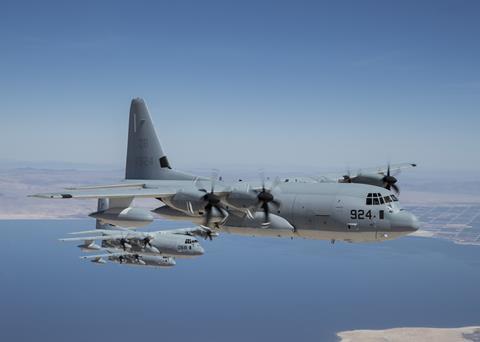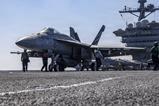A former general who oversaw the US Air Force’s (USAF’s) fleet of tanker and transport aircraft is warning recent battlefield success in the Middle East against Iran may be creating a false sense of security.
Mike Minihan, who retired from the USAF in 2024 as the head of Air Mobility Command (AMC), says the current build-up of US air power to backstop Israel’s ongoing campaign against Iran is being carried out with methods unlikely to be successful in the future.
“Once again, we’re grading our homework under permissive skies,” Minihan said in LinkedIn post. “And we’re living off the false comfort that tomorrow’s war will look like today’s rehearsal.”

Minihan, a Lockheed Martin C-130 pilot by trade, was a vocal advocate of greater investment into mobility capability who occasionally attracted controversy. He penned a 2023 memo distributed to thousands of AMC personnel under his command warning of a likely military conflict between the USA and China in 2025.
In uniform, Minihan defended the troubled Boeing KC-46 tanker and pushed the refuelling jet into service, arguing combat theatre commanders needed the capacity. However, in retirement, Minihan has publicly criticised Boeing’s work on the aircraft, which has required multiple redesigns to address defects.
China is once again on the retired four-star general’s mind, as Israel and Iran trade blows and the Pentagon flows resources into the Middle East.
“Because this is not China, we’re not contested in our ability to project power,” Minihan says. “Critical infrastructure won’t be attacked. Networks and command-and-control nodes won’t be degraded. We’re not punished for our inability to manage [electronic] signature.”
Open source flight tracking indicates that more than two dozen USAF aerial refuelling jets, accompanied by fighters, left North America throughout the week of 16 June, heading for bases in Europe and beyond.
Secretary of Defense Pete Hegseth on 16 June said he had directed the deployment of forces to the Middle East.
“Protecting US forces is our top priority and these deployments are intended to enhance our defensive posture in the region,” the Pentagon chief said.
Those assets have not yet participated in any publicly disclosed offensive action. American ships and aircraft have played a significant role in defending Israel during several large air attacks from Iran in the past 18 months.
However, that could change at any moment, with US President Donald Trump said to be weighing whether or not to join Israel in striking the Islamic Republic and its nuclear weapons development programme.
While neither Israeli fighter jets strike Iranian targets, nor American forces flowing into the region have thus far encountered effective defences or taken significant losses, Minihan warns this would not be the case in similar operations against a foe like China.
“Because this is not China, we’ll enjoy unchallenged travel to our war-fighting positions – and the manoeuvre that follows against a less-than-varsity foe,” he says.
Instead, the US and allies will face jammed communications, disruptions to navigational tools, and lethal targeting by long-range weapons.
“Mobility has suffered from decades of resourcing neglect,” Minihan says. “One day, that bill will come due – in the battle skies of the Pacific.”































